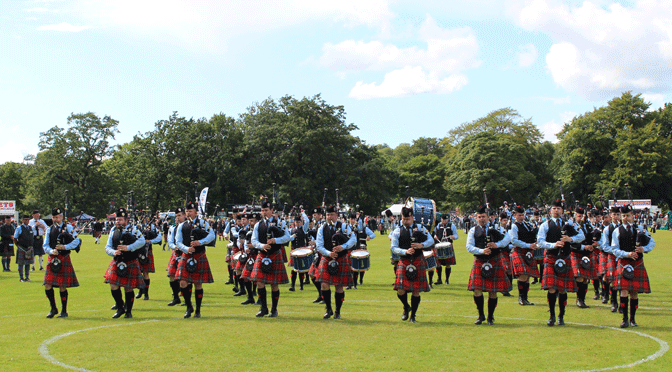
A cool wind blew from the north, a hot sun shone, and on a Saturday in late July 2015, a smile the length of the Liffey spread across the collective countenance of the lads and lassies wearing the green.
Dublin’s St Laurence O’Toole Pipe Band had won the Scottish Pipe Band Championship. They drove into second their ancient rivals, Field Marshal Montgomery, and in the process gave new P/M Alen Tully his first major championship victory, a victory that ended FMM’s hopes of another grand slam season.
It fair sets things up for the Worlds in a few weeks time, and all congratulations to Alen, his leading tip Stephen Creighton and their pipers and drummers. They’ve been knocking at the door throughout the 2015 season. They were my personal favourites at the UKs, and they only lost out on ensemble preference in a three-way tie at Forres’ Europeans.
All of that said, I have to be honest, I did not have them first at Dumbarton. Not that that matters one whit; my views are only of passing interest. It is the judge’s opinions that count, just as they did when I opted for SLoT at Stormont. My list, noted down immediately at the conclusion of the Grade 1 contest, was as follows:
1 Field Marshal
2 Shotts
3 SLoT
4 Scottish Power
5 Inveraray
6 Fife Constabulary
The actual result:
1 SLoT
2 FMM
3 Shotts
4 Power
5 I’ray
6 Glasgow Police

Scrutiny of the summary sheets shows that the ensemble judge and one piping judge agreed with me on FM, and the other had them second. The drumming judge made the difference, and FM’s lowly eighth position will have been a shock. Quite how a band can win an ensemble contest and be less than mid-table for drumming is difficult for my ill-educated brain to compute, but the percussionists among you will no doubt have some answers. Despite all of this, it should be borne in mind that had FM’s corps been a commendable third, SLoT would still have won.
Before we go any further a word of praise for Mr MacInnes the ensemble adjudicator. His approach was surely an exemplar for all those tasked with this difficult duty. He positioned himself at the head of the band and stayed there for the duration of each performance. None of this walking about willy nilly; one minute hearing lots of drums the next lots of pipes; the next lots of harmony the next lots of melody. No, Mr MacInnes did none of that. He stood his ground and listened to the musical unit, drums coming through pipes; the same for every band.
Now to my notes, jotted down ringside, and without the benefit of the close proximity enjoyed by the judges:
Bands had to submit two medleys. First on were Boghall. This was easy listening; relaxed music from a band playing within itself. P/M Ross Walker may still be searching for the strength of tone which has been such a feature of their performances in years past. The high A was thin, though well tuned, and the drone sound full and steady. The jigs need more lilt at this tempo; good fingering in the strathspeys; no major errors; first on, had they done enough to be considered for the list?
Cullybackey too struggled with sound. The blowing seemed to come and go throughout the medley, noticeably so on D in the slow air (hard to pick out the melody here); bass booming out at times, disjointed playing in the strathspeys; struggling towards the end with drones drifting.
Denny struck me as having pipes that needed another five minutes blowing before they came truly up to pitch. It was that sort of day. Sun out you were up there; sun gone, cool wind, pipes dull. This is a band that fingers its tunes very well – a lot of chanter work is clearly being done. Again the bass was too loud at times. Would a traditionlist judge be happy with Mrs MacPherson ravaged into straight, even-quaver pipe band, stick-friendly mode, as it was here? Mmmmm…
Taking classic ceol beag tunes and giving them this treatment is becoming fashionable. At Dumbarton we heard Susan MacLeod, Alick C MacGregor, the Little Cascade and the Balmoral Highlanders all given the flat-iron formula. My feeling is that sometimes it works, sometimes it doesn’t. Of one thing I am sure: I’d far rather bands went down this road than peddled those hand-knitted ‘melodies’ we hear, those with very little musical substance, difficult to memorise but easy to forget.
Shotts meant business. They played right on the edge for the opener, the sound balanced, full and true. Things dulled down in the jigs which needed to be up tempo if played this straight, without a lilting backbeat. A slight pointing on the first note of the groups of three GDEs in the Judges’ Dilemma would make all the difference. After this it was pure quality all the way. Pin-sharp unison, breaks and tempi, the final reels getting all the feet going, driven along brilliantly by Jim Kilpatrick’s corps.
The cool air may have been an issue for Inveraray; their chanters noticeably down on Shotts, or so they seemed. All fingering was a model of rectitude – really impressive, but just when you were losing yourself in the brilliance of the playing you were roused out of the reverie by a thumping bass and overstressed dynamics from the drummers. Sort this out and I believe P/M Liddell’s band will be back contending the top three again.
Scottish Power had a perfect scale to their chanters, the top hand, in a day of some dodgy high As, clear and true. There was not a poor tune in this medley and the delivery of it held the attention start to finish. The fingering was a shade indistinct in Struan Robertson, especially the doublings on C and E; the fifth part of the Little Cascade, usually such a feature of the tune, was, from where I was standing, over harmonised, the melody lost; the bass again thumpy at times. These points aside, this was exciting stuff from the Power who have recovered well from their shaky start to the season.
I was impressed by the showing from Fife Police. Failings to my ear: jigs a shade slow this even; blowing issues in strathspeys and on high A; thumping bass at times. That considered, this band had solid drones, good projection in the chanters, excellent technique and a strong, confident finish to their medley. Mid-table perhaps, but on this showing they were worth a prize in my book.
Greater Glasgow Police gave us the best jigs of the day up to this point. The drones were full and solid; chanters were, well, weak and thin on the top hand. In some ways the very good playing made the lack of depth of tone all the more annoying; this band could be serious challengers with a bolder, broader sound, particularly on the top hand. The playing, breaks, and tempi were all of the first order and they finished to well-earned applause from the large crowd.
I’m afraid the Vale of Atholl‘s medley just does not cut it. Setting aside any tone issues (low G and D), and their quality technique, there was simply not enough listenable music in this selection to hold the attention for any length of time. The slow air is a case in point. One hesitates to dignify it with such a title, being as it is more of a chant with a large dose of harmonies. Overall all tunes well played; mediocre melodically. The ability is there but the subject matter is not.
[wds id=”11″]
On came Field Marshal and from the first note the power and depth of sound set them apart from every other band on parade. Here was skilful, sophisticated playing on instruments tuned to perfection. They gave this listener all he wanted to hear. Later someone commented that the tenor drums were not tuned properly and someone else had reservations over the opening tune. The first was lost on me, and the second, well it may not be the greatest tune ever a piper fingered, but it is not the worst either. For me this was the package from FMM. Superb technique, perfect tempi, razor sharp breaks, depth and consistency of tone. The sun came out for Donald Cameron’s Powder Horn; the Gods, if not all the judges, were shining down on P/M Parkes.
The task of following that fell to St Laurence O’Toole. They were not fazed one bit – and why should they have been? Sound not as full as FM but cultured, clear and true, with just a suspicion of over-blowing on high A at times. Not a bad tune in this medley which captivated from the off, a lesson for some other bands. Jigs rattled along with outstanding fingering. Strathspeys nicely pointed with all requisite technique in unison; very strong, confident finish. A band that plays with a smile on its face and a song in its heart.
Ravara sounded well to begin with but then the tone tailed off. The jigs were sluggish and complete with serious note errors; the blowing definitely not sustaining in the slow air. The fingering in the strathspey was good except for the bubbly note which was out of sync. Competant playing from this band – nothing more, and you need more in Grade 1.
Overall an enjoyable competition with the top bands all playing well up to the mark. Pointers for the Worlds, the last major of the season? The first thing to remember is that we have two legs to contend with in G1. Consistency will be all. Equal will be the need for all contenders to go for it. Safety in the MSR will not be enough. At Dumbarton the majority did play on the edge; that will need to be replicated at Glasgow Green in both disciplines. The contest is wide open. Any of the top four could win. Discount FMM at your peril. SloT have had a huge boost to their confidence. Shotts are lurking, ready to pounce. The Power and Inveraray can stake their claim – they are that good. And we haven’t heard SFU, Dowco yet.
[wds id=”4″]
















“The drumming judge made the difference…”
As a piping father of serious drummer grrl, I find this something quite lovely. We’ve been in bands together that utterly dismissed drummers as necessary evils. I kept telling her, “You can’t have a band on the green without drums, and a band can’t win without them being a solid corp.”
We have since found her a band whose last competition results were firsts across the board, the nearest competitor 12 points behind.
There is nothing more powerful than the total package – pipers AND drummers coming together to bring out the best of the music. An awful lot of ink gets spilled on how pipers and pipes sound. None of it matters if the drummers are not right there, giving the dynamics and tonal support to create an ensemble whole that is greater than the sum of its parts.
Good for SLoT!